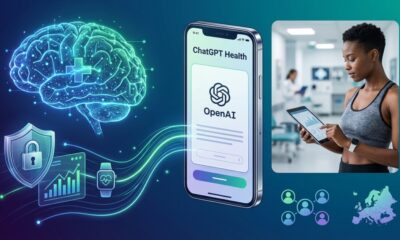Healthcare
Study Finds Human-Controlled Robot Improves Outlook for Hospitalized Children

A new study from UCLA demonstrates how a human-controlled robot can encourage a positive outlook and improve the medical interactions for hospitalized children, more so than a tablet.
The study was presented on October 11 at the American Academy of Pediatrics (AAP) National Conference.
Robin – Social Companion Robot
The social companion robot is called Robin, and it is four feet tall with the ability to move, talk, and play while being remotely controlled by humans.
The robot was used in studies carried out by specialists at UCLA Mattel Children’s Hospital’s Chase Child Life Program. These were hour-long video visits with young patients, and Robin was compared to interactions with a standard tablet from October 2020 to April 2021. The study ended with children and their parents being interviewed about their experiences, with the feedback being provided in a focus group. The transcription of the discussion was used to identify recurrent themes in the studies.
The Study’s Results
The results showed that ninety percent of parents who visited with Robin indicated they were “extremely likely” to request another visit. On the other hand, only 60% of parents whose children interacted with the tablet made the same indication.
Another interesting result is that children reported a 29% increase in positive affect after visiting with Robin. Positive effect was described as the tendency to experience the world in a positive way, and it can include emotions, interactions with others, and with life’s challenges. They also reported a 33% decrease in negative effect, and children who visited with a tablet actually reported a 43% decrease in positive effect and 33% decrease in negative effect.
The parents whose children had a visit from Robin reported that their children had no change in positive affect and a 75% decrease in negative affect. As for the children who had a tablet visit, their parents reported the children had a 16% increase in positive affect and no change in negative affect.
Some of the other benefits reported by the child life specialists who oversaw the visits included a greater display of intimacy and interactivity during play. They also reported increased control over their hospital experience and strong friendship bonds.
Justin Wagner, MD, is a pediatric surgeon at UCLA Mattel Children’s Hospital and senior author of the study.
“Our team has demonstrated that a social companion robot can go beyond video chats on a tablet to give us a more imaginative and profound way to make the hospital less stressful,” said Wagner. “As the pandemic continues, our patients are still feeling anxious and vulnerable in a variety of ways, so it’s critical that we be as creative as possible to make their experiences easier when they need our help.”
“We saw the positive effect in children, their families and healthcare workers,” continues Wagner.
There was also an increased sense of intimacy with and focus on the patient when it came to the staff, as well as increased staff engagement in social care.
Some of the challenges included a limited time for patient encounters and a learning curve for operating the robot. According to the team, the incorporation of this type of social robot can support and benefit young patients in an inpatient pediatric multidisciplinary care setting. `












